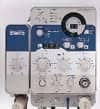Published in the American Journal of Respiratory Cell and Molecular Biology, the study exposed the neonatal mice to cigarette smoke daily for the first 2 weeks of their life. An age-matched set of control mice were used for comparison.
The lungs exposed to cigarette smoke were found to have inhibited type 1 and type 2 interferon pathway genes compared to the control lungs. Lung volumes at 8 weeks of age were significantly decreased in the mice exposed to the smoke as compared to those that were not exposed.
Infants exposed to cigarette smoke have a much higher risk of sudden infant death syndrome and lower respiratory tract infections. The researchers hope that their findings will help explain the increased incidence of respiratory symptoms in infants and children exposed to cigarettes smoke.
“Our murine model of cigarette smoke-induced neonatal lung injury may be useful in investigating pathways that are disrupted or altered in developing lungs exposed to cigarette smoke, and may help with understanding the overall detrimental effects of smoke exposure on developing lungs,” the researchers conclude.









